
Magic Words in the “Science of Reading”
Share
Magic Words is embedded in the “The Science of Reading”.
Magic Words advocates and promotes targeted, explicit, and systematic teaching of the core principles of learning to read. For over twenty years Magic Words has provided teachers and students with hands-on play based resources for teaching reading.
The Science of Reading is a term used to describe a similar evidence-based approach to teaching and learning to read, just like Magic Words. Like Magic Words, it emphasizes the importance of tracking and monitoring progress, targeted teaching of explicit skills, understanding (comprehension) and applying research from linguistics, psychology, cognitive science, and education to effectively teach children how to read.
An evidence-based approach is central to the idea that reading is a complex cognitive process that involves various skills and components, and it supports systematic and structured instruction to help students become competent readers.
The key principles of the Science of Reading include:
- Phonemic Awareness: This is the ability to recognize and manipulate individual sounds, or phonemes, in spoken language. The Magic Words games and activities delivers hands on literacy activities to teach and practice phonemic awareness.
- Phonics: Phonics instruction focuses on the relationship between the sounds (phonemes) and the representations of those sounds as letters (graphemes). The Magic Words provides a targeted, explicit, and systematic approach to helping students decode words by sounding out the letters and blending them together.
- Oral Language: Expanding a student's vocabulary is crucial for reading comprehension. The more words a student knows the greater the capacity to read and learn.
- Fluency: Fluency refers to the ability to read text with accuracy speed and expression. Rapid Automatic Naming (RAN) with the Magic Words Playing Cards increases automaticity to improve reading speed and accuracy. Also practising reading passages from books containing the high frequency words (used in RAN) builds fluency and competence in reading.
- Comprehension: Understanding the meaning of what is read is the goal of reading. Strategies such as read and retell, summarization, and applying knowledge assist in improving reading comprehension.
- Vocabulary: A core bank of automatic words (approximately 300, which provides 70% of all words, on average), covering all the high frequency words, are critical to all readers fluency and comprehension in reading.
- Assessment: Regular assessment is essential to tracking and monitoring students’ progress on a regular basis and adapting and modifying teaching and learning instruction from the evidence gathered in learning to read.
The Magic Words Professional Learning session covers all seven key principles and highlights the best strategies for maximising the reading outcomes for all students'.
Related Posts
-
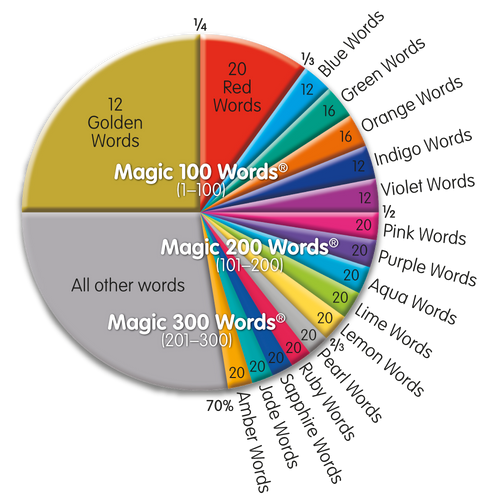
Research behind the most important words in reading
Magic Words resources are designed to support the average reading of a person in a population so that they can confidently pick up any reading material, reading scheme, daily newspaper etc. and be a competent reader.
-
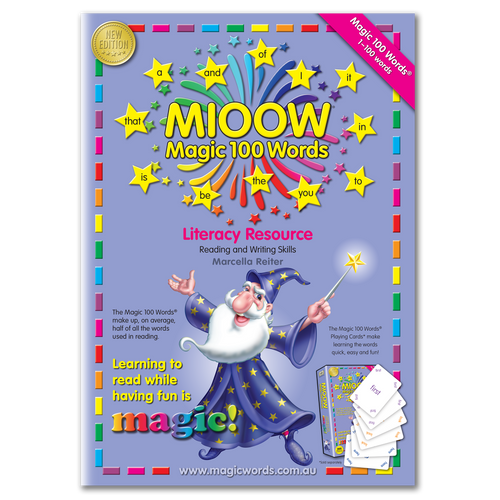
Swap original for new!
Swap an original edition (2000, 2001, 2002, 2004, 2007, 2011 or 2015) of the Magic 100 Words Literacy Resource Manual for a new revised and updated 2018 edition for a limited time at half price.
-

Play Jumble Words
Jumble Words - select one of the Magic Words Playing Cards
-

Magic Words Extension Pack
-

Spelling the sound -er with Magic Words
You can use the Magic Words Playing Cards to learn the spelling sound /er/: ur, ir, ear, or er.
-

Premium Home Pack - Magic 100 and 200 Words
-

Magic Words Certificates
-
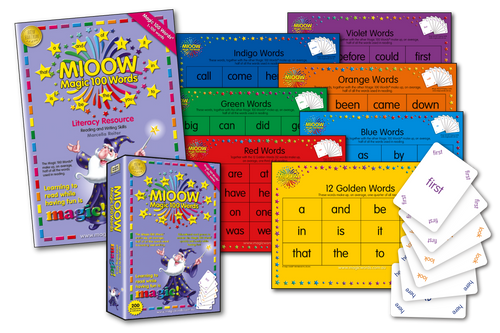
What are the Magic Words?
Magic Words are the most common words in English and the most important words in learning to read.
-

Double letters with Magic Words
Use your Magic Words Playing Cards to teach double letters.
-

Phonics
Phonics programmes start children off by learning a few letters e.g.
s, a, t, p, i, n as the first sounds.
-
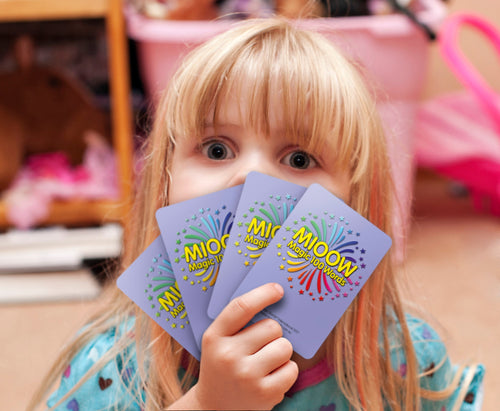
Spelling with Magic Words
Top strategies and activities for learning how to spell sight words.
-

Science of Reading
Learning to read is an important part of every child’s development. It helps build important, lifelong skills in areas such as language, concentration, critical thinking and memory.
-

Magic Words Australian Benchmarks
MIOOW® Magic Words® Recognition Tests are individually administered and are designed to record each student’s knowledge of the most frequently used words.
-

How reading to your child improves development
In this article, the team at Magic Words explores how reading to your child not only improves their development, but also can be fun & engaging.
-

Professional Learning
Magic Words is used in schools all around the world and in over 80% of Australian Primary Schools.
-

Magic 200 Words
Magic 200 Words Literacy Resource Manual - 2017 Third edition now available.
-

Learning to read with Magic Words
Magic Words are the most important words for every child to learn.
-
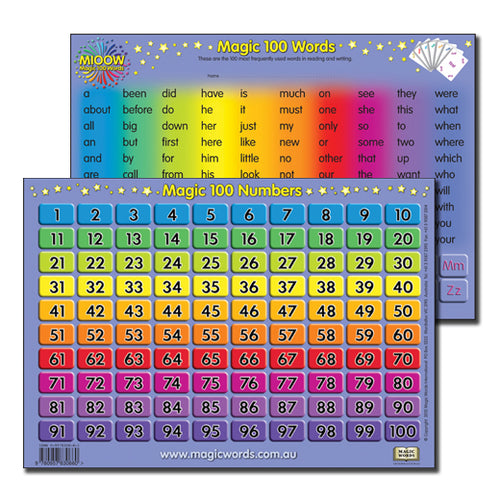
Magic 100 Words Deskmat Games
Start by writing your student's name on the top of the Magic Words desk mat (mat) in the space provided.
-
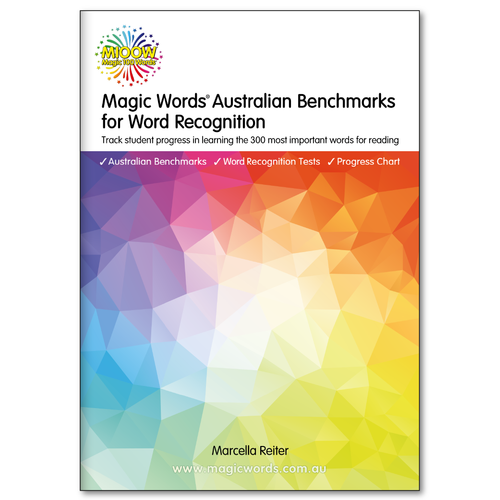
A-E Standards
Magic Words Australian Benchmarks for Word Recognition Manual allows teachers to measure a student’s:
-

Magic Words Learning Boards
The Magic Words Learning Boards match the sheets that are used in schools and sent home for learning the Magic Words, which are the most frequently used words in reading and writing.
-

Play Based, Hands-On Learning
Learning to read and spell with play-based, hands-on activities and materials for literacy success.
-

Foundation Home and School - Magic 100 Words
Foundation/Prep/Kindy Home Pack is ideal for Foundation, Prep, Kindergarten (NSW), Reception (SA) and Pre Primary (WA).
-
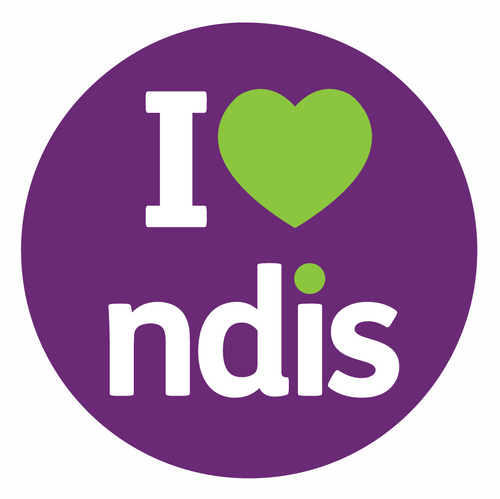
NDIS Registered
Magic Words International is an approved provider for the NDIS.
-

12 Golden Words
The most important words in Learning to Read. Learning the 100 most frequent words in English is essential to every child's reading success.
-
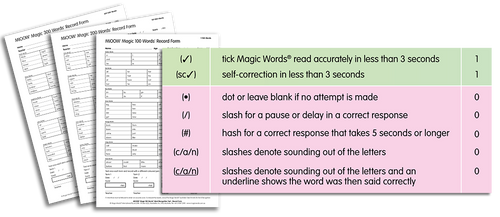
"Taught v Caught" - Back to School Testing
Magic Words Recognition Tests are a quick and easy way to check each student’s progress,
-

Magic Words Learning Board Games
Learn how to read and write with the Learning Boards and Playing Cards.
-
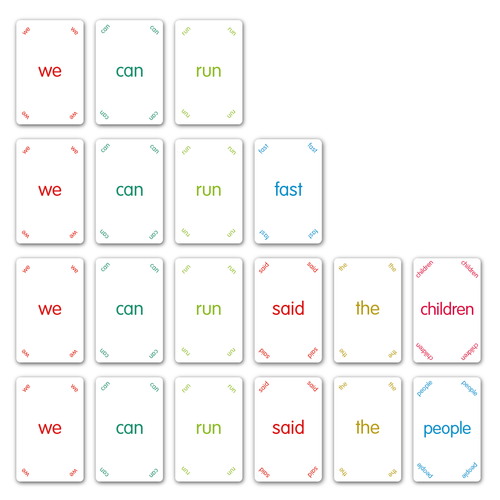
Magic Words Card Games
For top results match the Playing Cards to the book your child is reading.
-

Teaching Magic Words
Students who learn the Magic Words rapidly improve reading, fluency and comprehension.
-
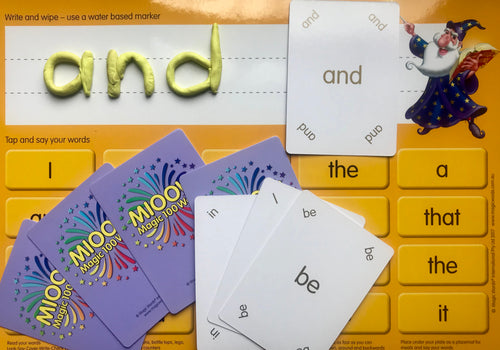
Spelling Magic Words
Use a water based marker on the front of the Magic Words Learning Board to practice tracing the Magic Words in the level the child is learning.
-
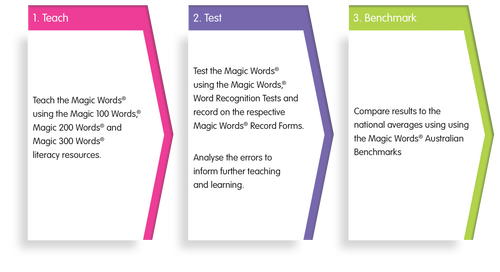
Magic Words Assessment and Benchmarks
Magic Words Australian Benchmarks measures progress in literacy proficiency for assessment, tracking and monitoring, and reporting
-

Classroom Teacher Optimum Pack with Benchmarks
Optimum Classroom Teacher Pack includes ALL Magic 100, 200, and 300 Words Literacy Resource Manuals, Playing Cards, Learning Boards, Test Kit and Australian Benchmarks.
-

The benefits of developing reading skills during childhood
Promote a love of reading and start developing better reading skills in your children with our quality word packs and fun games available at Magic Words.
-

Spelling tricky words with Magic Words
Use the back of the Magic Words Learning Board to practice spelling the Magic Words in the level the child is learning.
-

Optimum Pack - Magic 100, 200, and 300 Words
The Optimum Home Pack includes ALL Playing Cards and Learning Boards for learning all the Magic Words.
-

Assessment and Reporting
MIOOW® Magic Words® Recognition Tests are individually administered and are designed to record each student’s knowledge of the most frequently used words.
-
Easy Magic Words
There are over 20 two letter Magic Words!
-

Magic 100 Words
Magic Words are the most common words in English and are the most important words in learning to read and write.
-

M100W - Magic Words Literacy Workshops
Schools using the Magic Words as a key strategy of their literacy program, achieve outstanding success.
-
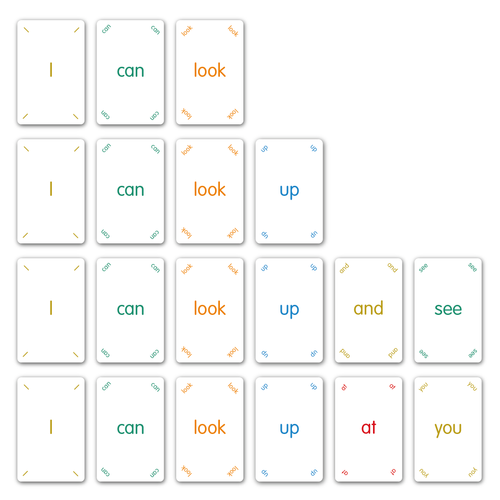
Sentence Game
This game is particularly good at improving short term auditory memory
-

Beat the Clock - Fluency Games
Learning to the say the Magic Words quickly is an excellent way to get better at reading and recognising the words.
-

Wish
"I Wish, I Wish" has shown to be one of the most popular Magic Words games both in school and at home.
-
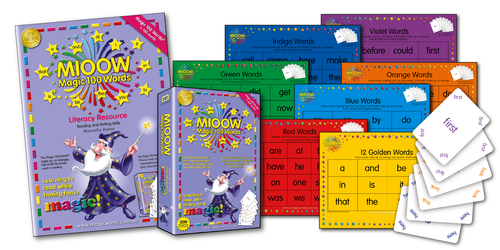
Copyright
The M100W - Magic Words materials are copyright and trademark protected. All rights reserved.
-
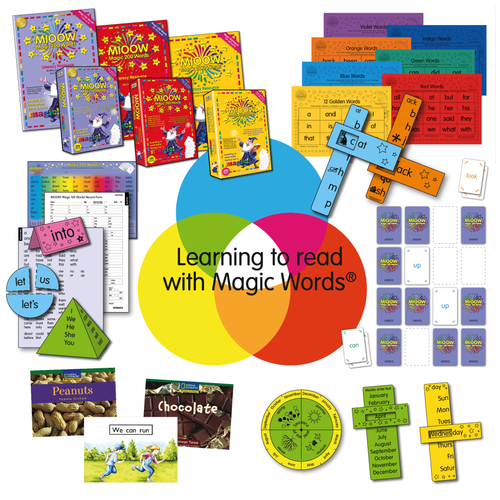
Magic Words
The Magic Words are the most frequently occurring words in all books, readers, magazines and newspapers.
-
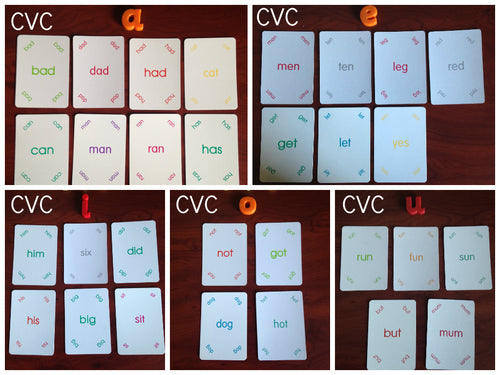
Magic Words and CVC
CVC words are words that follow the letter pattern, consonant-vowel-consonant.
-
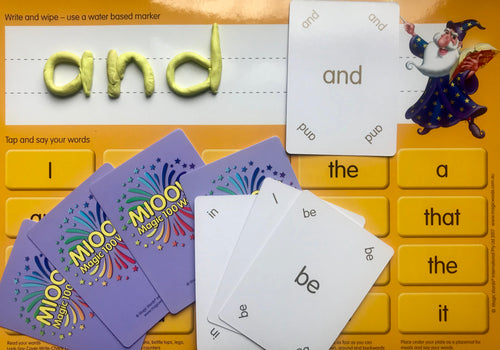
How to start
Locate the Magic Words from your child's book or the Magic Words Learning Board; then select the matching words, from the set of Magic Words Playing Cards.
-
Writing the Magic Words
The Magic Words Playing Cards and Learning Boards are printed in the reading font most commonly used in children’s readers/books.
-

Magic 100 Words and Numbers Board Games
The aim of the game is to be the first player to reach the “your” square (words side) or the “100” square (numbers side).
-

Background - Magic 100 Words
Magic 100 Words are the most common words in English and make up half (50%) of all the words used in learning to read and write.
-
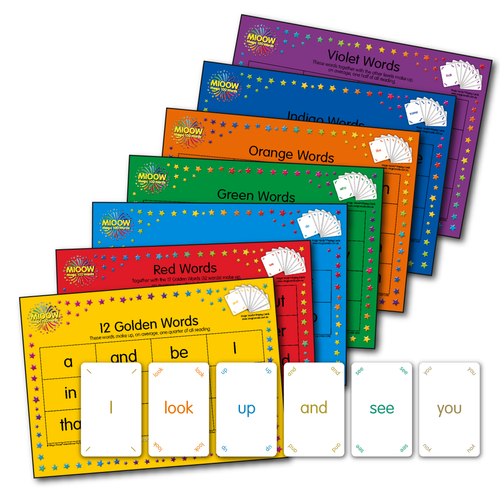
Fast Words
Ask your child to look at the words on the back of the Magic Words Learning Board and invite them to play the following games.














































